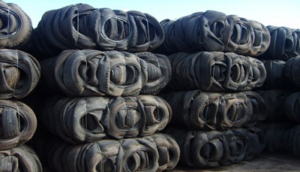Michigan awards $2 million for scrap tire market development
Lansing, MI – The Michigan Department of Environment, Great Lakes, and Energy announced the funding of more than $2 million in grants to develop new markets for used vehicle tires. When illegal dumping in the environment occurs, scrap tires pose both a fire hazard and a human health risk as a mosquito breeding ground.
These scrap tire grants support building sustainable markets for recycled tire materials in Michigan. Grants have traditionally included support for essential equipment and materials that aid in the establishment of new markets, including various manufacturing processes, implementation and testing of paving materials, energy generation, and other innovative approaches.
These grants contribute to a more sustainable business model for the scrap tire industry through increased market opportunities for scrap tire processors, end users, and manufacturers. The 2023 funding will be used to support the following projects:
Cobalt Holdings, LLC (Cobalt), $573,530: Cobalt will purchase equipment for processing oversized off-the-road tires (OTR). These are tires larger than for a passenger vehicle or semi-truck. In addition, equipment for making finished products, including agricultural mats, will be purchased. This equipment will allow Cobalt to process OTR, which is needed in Michigan, and make a product with the crumb rubber. Addition of agricultural mat production in the Midwest is also beneficial with current shipping costs.
Porous Pave, $60,000: The grant will provide 50% of the funding for installation of a rock washing system (50% = $30,000), and an additional funding of $30,000 for Porous Pave/HydroBlox installation development and testing. HydroBlox and Goodwill Industries of West Michigan, Inc. (Goodwill), are working in partnership. Goodwill locations in Michigan will provide recyclable plastic materials, and HydroBlox will be produced in West Michigan. Porous Pave and HydroBlox used in combination will begin addressing many drainage issues at sites across the state.
Michigan Technological University (MTU)-Dixie Highway, $418,814: MTU will work with the Saginaw County Road Commission to rehabilitate 2.3 miles of Dixie Highway with a dry process rubber modified asphalt overlay, which includes the use of a rubberized Stress Absorbing Membrane Interlayer (SAMI). The existing concrete pavement surface is 80 years old. An additional six miles of the project will be used as a control comparison section.
Michigan Technological University-Midland Road, $482,549: MTU will work with the Bay County Road Commission to pave a one-mile section of Midland Road in Bay County utilizing dry process rubber technology. Midland Road is being upgraded in preparation for the upcoming U.S. 10 repaving.
Ingham County Road Department (ICRD), $37,931: This grant helps to fund an ICRD road rehabilitation project on Fitchburg Road (form Parman Road to 4,000 feet west), including installation of approximately 5,510 cubic yards of tire derived aggregate (TDA) in a 750-foot span of the project. Use of the TDA as lightweight fill over deficient subgrade soils will utilize approximately 250,000 passenger tire equivalents. The project will be funded with $37,931 from the fiscal year 2023 Market Development Grant funds and a scope change for an ICRD Market Development Grant project funded in 2021 that could not be completed due to supply chain issues (FY 2021 grant funding of $450,000). Total amount granted for completion of the project is $487,931.
Rubber modified chip seal, $464,947: Two projects for a total of 32 lane miles are being funded to expand the use of rubber modified chip seal throughout Michigan.

